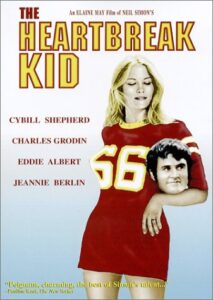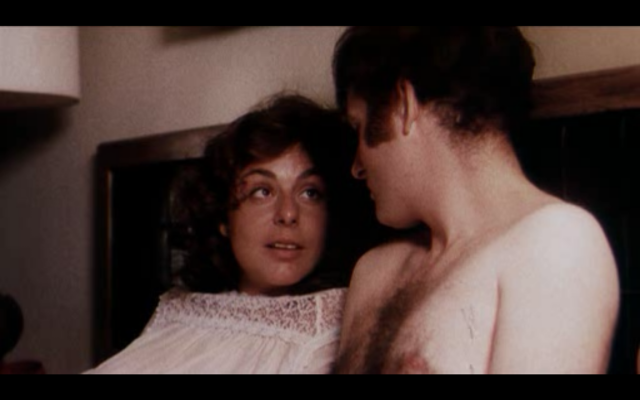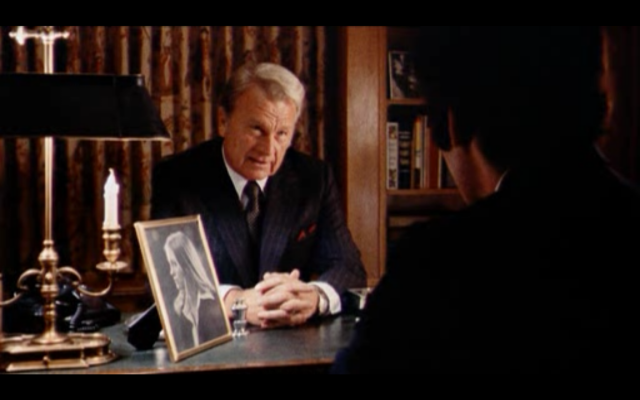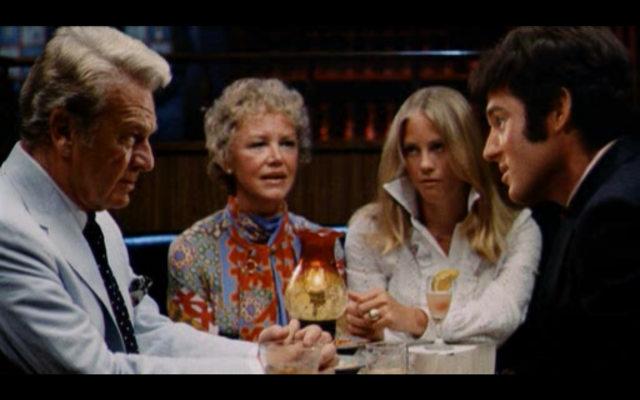Heartbreak Kid, The (1972)
“I married a grouch!”
|
Synopsis: |
|
Genres, Themes, Actors, and Directors:
Response to Peary’s Review: Indeed, it’s deeply discomfiting to find oneself laughing at Grodin’s bald-faced deceit towards his hapless wife, who becomes trapped in the ultimate living nightmare during what should be the happiest time of her life. Nonetheless, the film is so full of “hilarious, sharply satirical scenes” — Berlin irritating Grodin by drawing circles on his chest; Berlin smearing egg salad all over her face; Grodin waxing enthusiastic about the humble pleasures of midwestern food — that we can’t help remaining glued to the screen, curious to know what will happen next to our determined anti-hero. Deftly directed by May, and wonderfully acted by the “superb cast” — including Jeannie Berlin in what should have been a career-defining role (what happened?), Eddie Albert in a priceless performance as Kelly’s WASPy father (who solemnly asserts he wouldn’t approve of Grodin “if you tied me to a horse and dragged me forty miles by my tongue”), and Audra Lindley as Kelly’s “easily impressed mother” (watch her quietly hilarious silent reactions). Note: The parallels between this and May’s feature debut, A New Leaf (1971), are startlingly clear: Grodin’s Lenny Cantrow and Walter Matthau’s Henry Graham are both arrogant, self-centered men who make life miserable for their new wives (Jeannie Berlin and Elaine May, respectively) — both of whom are sloppy, mildly irritating, but ultimately utterly endearing to audiences. Knowing Berlin is May’s real-life daughter makes the parallels even eerier. Redeeming Qualities and Moments:
Must See? Categories
Links: |







6 thoughts on “Heartbreak Kid, The (1972)”
I will agree this is “a disturbingly provocative dark comedy.” And since I’m always decisive re: whether a film is a must, I’ll decide that it is. “Disturbingly” so.
For that reason – because I find it disturbing, for a comedy – I can’t admit to warming to the movie a whole lot. But I will admit that it is unique. (I can’t help, at the same time, seeing it as part of a trilogy, combined with ‘Goodbye, Columbus’ and ‘The Graduate’ – both of which, as Peary notes, have the Jewish guy on the hunt for his Shikse Goddess: btw, I do seem to recall thinking Hoffman’s character in ‘The Graduate’ was Jewish.)
It’s true that the protagonist in this and in May’s earlier ‘A New Leaf’ have much in common. In fact, the two films in general seem to have a lot in common: they are both harsh, hard-nosed looks at life, viewed through a cynical if comic lens. The main difference is that ‘THK’ does not have the kind of gentle anchor that May’s character Henrietta gives to ‘A New Leaf’. (As a result, though I enjoyed ‘ANL’ immensely throughout, I felt squeamish and bothered throughout ‘THK’. Not only does Grodin grate on me – but so do the annoying Berlin and the manipulative Shepherd. We come to learn who really rules the roost in the latter’s home, even as we realize that Shepherd wants someone as determined as her Daddy.)
Like May’s first film, her second receives a more interesting title when the story is transferred to screen. The title ‘The Heartbreak Kid’ tells us two important things about the film’s main character: 1) that he has practically a cowboy spirit, and 2) that he is as aimless as a child. I can find value in those things in a main-character-driven film.
I do have a fave scene (during which I actually laughed): when Grodin “lays his cards on the table” with Albert (who, by far, gives the best performance in the film – and this scene is partially why; in fact, I might say the film should be seen for him alone).
And I’ll give an honorable mention: when Grodin (who, in the film, often seems Alan Arkin-ish) has chased Shepherd down on campus and, finally in the car with her, comes to realize: “I’m a shmuck!”
Since this is eventually fashioned as some kind of ‘feel good’ flick, all seems to ambivalently end well. And we ask ourselves, should it end well? And then we realize…this is how life is.
I like that you call out Albert’s performance in particular — I was also REALLY impressed; who knew he had it in him?? Makes me wish he was cast in a heck of a lot more films later in his career.
Re: Berlin’s character. She certainly starts off irritating as all get out; Berlin does a great job convincing us that Grodin would quickly feel qualms about his choice in marriage partners (though what DID he find appealing enough about her in the first place to even start dating her? That question niggled at me a bit, something I didn’t note in my assessment above). However, about midway through the film, by the time Grodin really starts showing his a**hole colors, I felt she stopped being an annoying caricature and turned into someone truly worthy of our sympathy — someone who REALLY didn’t deserve anything close to the kind of treatment she got.
Re: Berlin’s character…
Part of the problem the actress has is the unfortunate task of playing the role as written. I haven’t read Friedman’s original story, but Neil Simon saddles Berlin early on with various verbal ‘tics’: making repeated remarks such as “That will be us in fifty years.”; singing one of their wedding songs – ‘Close To You’ – over and over, etc. (The material does have a whiff of misogyny.)
The problem the character faces in the second part of the film is that the cards have been stacked against her at that point, and she has not been allowed much reprieve (unlike Henrietta in ‘ANL’, as I mentioned). No, of course she doesn’t deserve having Grodin ‘drop a bomb’ on her as he does – she’s kind of pathetic, not despicable. But neither does she have any real epiphany of self-examination either. (That might have been more interesting, as opposed to the screenplay simply ejecting her. On the other hand, what’s often unbelievable in film is that a character changes for the better of the film – and as an example for the audience – but, in real life, people rarely change what basically makes them tick. And ‘THK’ is very much about real life. We know Grodin’s character will never change. And it’s his story.)
Perhaps what’s more to the point about Berlin’s character is that she is heavily clouded by being in an awful situation. She can’t really breathe as a relaxed, content newlywed. Perhaps if she had married someone who was a little more like she is or someone who could nurture her good qualities, we might possibly see a different, kind of goofy couple bantering with each other. But that’s not the film we’re given.
Jeannie Berlin was also splendid three years later in ‘Sheila Levine is Dead and Living in New York’ which I’m quite surprised to discover Peary has missed from his book (it seems very much one of his sort of films).
It’s a film that’s been difficult to see in anything other than an old, horrible pan-and-scan VHS release print – but TCM recently gave it a restoration and a showing. It’s worth tracking down.
I watched “Sheila Levine…” on YouTube (terrible copy) a few years back, specifically after watching and enjoying Berlin in “Heartbreak Kid” — and unfortunately, I have to say I really disliked it. (I read the novel first, so was using that as a point of comparison.)
Definitely a great film and a must see. This is unlike any other movie with a fairly unlikeable character as its main protagonist whom we kind of support in his quest to marry a very pretty girl who would normally be out of his league. Having seen the film twice I still cannot make up my mind whether Lila is annoying or just endearing. She does however have a lot more to offer than Cybill Shepherd’s Kelly.
There are so many enjoyable scenes but the ones with Eddie Albert are priceless and probably set the benchmark for any disapproving father to-be. Otherwise all roles are well played (except maybe for the sport jocks who look too old) and there is never a boring moment.
It’s a film that defines cringeworthy!